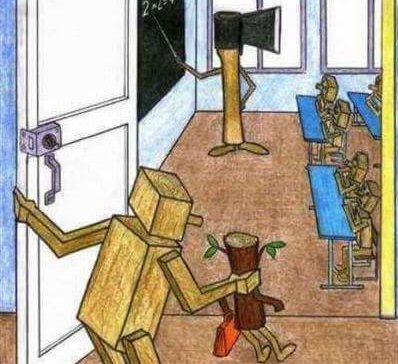How could trust revolutionize education?
Peter Gray defines unschooling in his book Free to Learn, as “the category of home-based education most compatible with trustful parenting.” In this way, the parent is placing trust in the abilities and instincts of the child instead of allowing outside authorities to dictate what, where, when and how to learn.
Unschooling is a child-led, deadline-free and respect-centered method of parenting.
But unschooling is NOT passive. In choosing to unschool, a parent is choosing to take a very active and mindful role in their child’s life. They must be present in supplying the child with what they need to pursue their interests. Unschooling is not simply an educational choice. It is an active realization and respect for a child’s natural curiosity and love of learning.
Children are born with an innate love of learning. It starts with watching and simply absorbing. Then it progresses to grabbing, tasting, maneuvering, exploring and experiencing anything and everything they can. Parents and caregivers watch them and create environments in which they are able to do all of this beautiful learning through interest–led exploration. What an exciting time!
Everything in the whole world is brand new to them and they are on a mission to see it all! They don’t need us to tell them how to look at and absorb new information. They are naturally inclined to do so because human beings start out curious, eager and able to learn. At a certain point they begin making sounds, putting those sounds together and forming words and sentences. They start to count and recognize letters and numbers.
They do all of these things by absorbing the information in their environment and by watching us, asking questions and listening. They are interested and enthralled by the world around them.
At this point, if we were to go the traditional route, it would now be the time to begin trying to harness and control that powerful learning energy. We would do our best to direct that energy toward the things that we are told are essential to learn, as dictated by various authorities (the school system, the pediatrician, well-meaning friends or family members).
Instead of being given the freedom to learn what they want, children are told to sit down, shut their mouths and absorb the information in front of them, placed there by someone else with a differing agenda to their own. They are made to memorize facts, jot down notes and devote that precious energy toward things that they don’t necessarily find interesting. Then they are tested on those things and their worth is summed up in a grade, ranging from PASS to FAIL.
Children are being labeled as slow learners, poor test-takers, lazy, too energetic, rude, too quiet or too loud (to name a few) when they are just simply not interested. They are not interested and they are being punished for it, stifling their spirit and dulling their desire to learn.
What if, instead of trying to force a child to learn, we aided them in doing something that they are naturally inclined to do? What if we supported and facilitated their interests instead of persistently trying to redirect it, applying punishments and judgments?
Unschooling and respectful, trustful parenting go hand in hand. Children are meant to experiment, navigate social situations and seek knowledge and understanding. Unschooling, as a way of life, creates a loving, supportive and secure foundation from which children can grow into self-directed and self-assured individuals.
By forcing children to sit and learn what is put in front of them, we are dulling their natural curiosity and instilling self-doubt. We’re telling them that, on their own, they don’t have what it takes.
However, the complete opposite is the truth. Children don’t need to learn how to learn because they were born already knowing. Imagine the progress that could be made by a generation of respectful, free-thinking, self-motivated children growing into adults who never lost that drive to learn.
Unschooling is a way of life that serves the individual from childhood all the way through adulthood, forming a purposeful, productive member of society. The assumption of the unschooler is that they do not learn. If you were to scratch the surface, you would see a deep-rooted love of active learning.
The unschooling movement is a respectful, peaceful revolution that has the potential to change the world in a single generation. Leaving our children with a better world is the ideal dream of most parents and by respecting and trusting our children, it can become a reality. Through unschooling, the individual will be given an invaluable set of tools to change and shape a new world.
This article was sourced from The Daily Bell.
 By
By